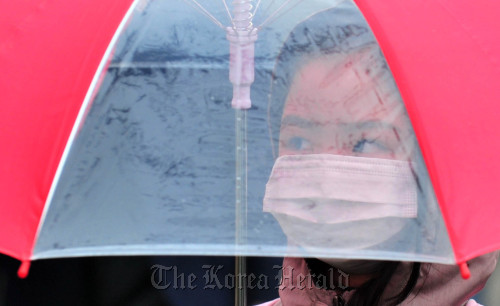Officials say no hazard expected from crippled Japan nuclear plant
The government’s safety assurances over radioactive rainfalls on Thursday could not relieve the concerns of citizens, especially parents of young children.
Some schools suspended classes Thursday as seasonal rainfalls scattered across the nation, while vehicles of worried parents crowded the entrances of schools that did open.
Lee So-young, a working mom with a 6-year-old son, drove her son to kindergarten after dressing him in a raincoat.
“There’s nothing special that parents can do for now. I’m just feeling confused,” she said.
In Gyeonggi Province alone, some 100 kindergartens and schools were closed due to the scare over “radioactive rainfalls” following the widening nuclear crisis in neighboring Japan.
The Korean government said Thursday that small traces of radioactive material have been detected in rainwater samples collected at all monitoring stations nationwide.
Officials, however, made it clear that the minuscule amounts will pose no health risk to the public.
The government’s safety assurances over radioactive rainfalls on Thursday could not relieve the concerns of citizens, especially parents of young children.
Some schools suspended classes Thursday as seasonal rainfalls scattered across the nation, while vehicles of worried parents crowded the entrances of schools that did open.
Lee So-young, a working mom with a 6-year-old son, drove her son to kindergarten after dressing him in a raincoat.
“There’s nothing special that parents can do for now. I’m just feeling confused,” she said.
In Gyeonggi Province alone, some 100 kindergartens and schools were closed due to the scare over “radioactive rainfalls” following the widening nuclear crisis in neighboring Japan.
The Korean government said Thursday that small traces of radioactive material have been detected in rainwater samples collected at all monitoring stations nationwide.
Officials, however, made it clear that the minuscule amounts will pose no health risk to the public.

According to the Korea Institute of Nuclear Safety, the highest concentration of 2.02 becquerel per liter of iodine 131 was measured in Jeju, considered to be the first area affected by Japan’s radiation leaks.
Even if a person were to drink 2 liters of the rainwater every day for one year, the radiation to which he or she would be exposed would be 0.0307 millisievert, far below the annual permissible level of 1 millisievert, the nuclear regulator said.
“Some areas showed increases in the radiation concentration, but the change was not meaningful from a scientific perspective,” said Yun Choul-ho, the KINS president, adding that drinking water has a higher impact than breathing the air.
Considering the direction of the air current, he said, the materials have arrived on the Korean Peninsula after traveling around the world on the prevailing westerly winds, not right from the crippled Fukushima nuclear plant.
The Korea Meteorological Administration also forecasted on Wednesday it was unlikely that radiation in the atmosphere above Japan would hit the nation directly in the coming three days.
Meanwhile, no radiation contamination has been detected in the government’s safety inspection on all 1,450 import items from Japan as of Wednesday, officials said during a meeting earlier in the day.
They also said the Japanese government was positively considering Seoul’s proposal to dispatch nuclear experts to the quake-hit country.
The Ministry of Education, Science and Technology reported that it had urged local educational offices to remain calm to not cause panic among parents and students.
By Lee Ji-yoon (jylee@heraldcorp.com)










![[Today’s K-pop] BTS pop-up event to come to Seoul](http://res.heraldm.com/phpwas/restmb_idxmake.php?idx=644&simg=/content/image/2024/04/17/20240417050734_0.jpg&u=)





![[KH Explains] Hyundai's full hybrid edge to pay off amid slow transition to pure EVs](http://res.heraldm.com/phpwas/restmb_idxmake.php?idx=652&simg=/content/image/2024/04/18/20240418050645_0.jpg&u=20240419100350)

